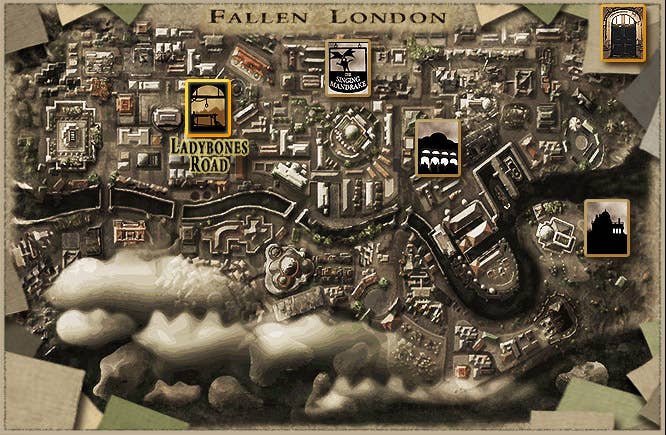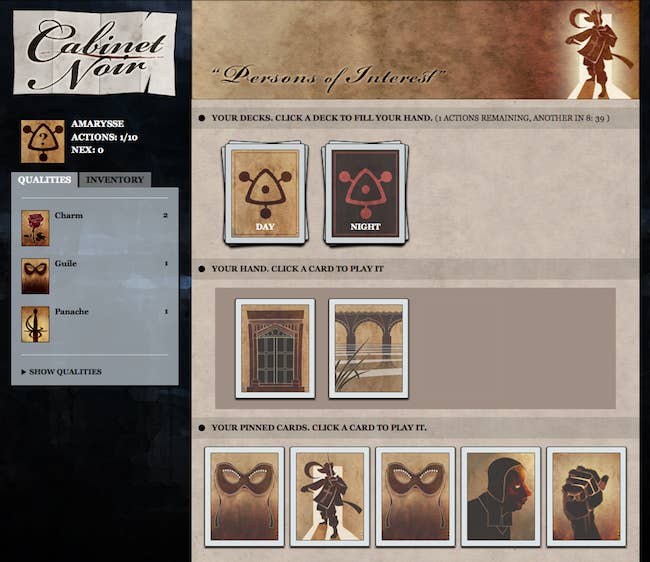StoryNexus: Writing Fantasy
How Failbetter Games hopes to evolve interactive fiction
As generation-bridging marketing statements go, Alexis Kennedy's "It's sort of YouTube for choose-your-own-adventure," is pretty catchy. For me, it conjurers up memories of abortive attempts at emulating the likes of Ian Livingstone and Steve Jackson as a kid, scribbling away on random pages of A5 notebooks in a vain attempt to produce the next Freeway Fighter or Caverns of the Snow Witch.
It's harder than it looks, even if, like me, you were so obsessed with the dice-rolling novels that you erased your way through many an adventure sheet. It's fiddly, and almost impossible to plan coherently on pen and paper, let alone to balance. Usually, after a grand opening, a fight with some wolves and a half-hearted exploration of some gloomy forest, my homespun choose-your-own adventures guttered out like a torch in a spider-filled maze.
Failbetter Games wants to make sure that no-one has to share the bitterness of these broken dreams. With StoryNexus, a browser-based tool for creating Interactive Fiction, and potentially getting paid for it, the small team hopes to save millions of innocent notepads worldwide from the ignominious fate of being abandoned by paragraph 10.
"Most interactive stories, unless they're a variation on simple hypertext, end up with game-like elements"
And, the creator promises me, you won't need previous programming or dungeon mastering experience to create your own universes through the browser-based toolset, just "basic literacy. That's it, really. Writing skills and narrative design ability are a big help, of course."
"The system's much richer than the old CYOA approach," Kennedy continues. "You build content as little chunks of microfiction with attached choices - 'storylets' - and then decide which ones are going to show up when. So a player reads a storylet, makes a choice, things change and then other storylets open up; and with every choice they make, other storylets open or close."
To continue the analogy to Fighting Fantasy and its ilk, Storylets are the paragraphs of the system, except 'played' like event cards in a board game, offering readers a choice of adventures and actions which affect user-defined stats or conditions. By keeping the underlying mechanics fairly simple but allowing almost total customisation of these elements, StoryNexus offers surprising flexibility, allowing complex game worlds to be built on the system's foundations.
"Most interactive stories, unless they're a variation on simple hypertext, end up with game-like elements," Kennedy explains. "Parser IF, the oldest and richest tradition of interactive narrative, nearly always has elements of exploration and resource management, even if the resources are things you pick up.
"There's a distinction between game-like elements and game-like content. I mean, an inventory-like mechanism might be somewhere you keep keys and guns, but it could equally be a place where the game keeps track of favourite sins, or family members."

Kennedy should know, as one of the lead writers for Failbetter's main commercial venture, Fallen London, he used almost exactly the same tools available to StoryNexus users to create a sprawling world of steam-punk devilry, undeath and distinctly British espionage.
"I'm sure we will," the former English teacher tells me when I ask if he thinks he'll see user submissions on the scale of Fallen London.
"The tools allow team working, and the largest created world already is about 15 per cent of the size of Fallen London - and we've only just come out of closed beta. One of the core design ideals of StoryNexus was to make content cheap and quick to build, so people can test, iterate, get stuff playtested and live literally in minutes. Creators get very productive with it."
Indeed, the projects produced so far offer a glimpse into an incredible array of worlds, from the deeply personal to the more traditionally fantastic.
"We expect to see a long tail of personal or highly specialised (or simply unfinished) stuff - experiments, diaries, games set up as part of a tabletop D&D campaign, interactive marriage proposals.
"Creators get royalties of just over 60 per cent of the value of any Nex spent on their world"
"From a commercial point of view we like this because it's a training ground, because these creators will also be engaged players, because they'll tell their friends. But from a creative point of view, I've always liked the idea that we're providing a tool that people will use to build and share stories that are important to them. So, classic iceberg, I think - games intended for entertainment or education at the top, and then an awful lot more just under the surface."
As fun and cathartic as this sort of writing can be, furnishing your StoryNexus with thrilling adventures and nefarious characters doesn't need to be a purely selfless artistic exercise - there's gold in them giant-infested hills. Once a world is live, its creators have the option of monetising it, utilising the universal in-game currency of Nex.
"Failbetter sells it to players, players spend it on creator worlds," says Kennedy. "Creators get royalties of just over 60 per cent of the value of any Nex spent on their world."
Because that payment system is almost as granular as the world-building system itself, allowing creators to charge entry to an entire world upfront, offer a demo with a paywall after a certain time or a free-to-play model with in-game purchases, users are able to monetise as they see fit.
"It's up to creators to decide what to charge for and what prices to set - we expect to see everything from free games to games where there's a paywall at story start. But the default is F2P.
"It's very much a partnership - growing the audience of one world helps us and helps the whole community. We've got a very active community going already, and we're keen to nurture it."
But, as numerous enablers of user-generated content have already discovered to their cost, allowing your customers total creative freedom can all too quickly result in a knock on the door from representatives of various legal departments. What happens when someone creates a world of IP-infringing fan-fiction and publishes it via StoryNexus? Is there a curation process in place?

"Publish-then-filter," Alexis reveals. "A StoryNexus world is live on a unique URL as soon as it's been created, and we provide some promotional tools for world creators - so it's out there straight away. But we then review, and only the best stuff gets to the front page of the site."
In addition to that, and some of the same reasons, ownership of, and responsibility for, all content on the site remains with its creator.
"For them, it means they retain editorial control; they can take their toys home at any time; they can work for hire or use it for their narrative design portfolio or turn it into a novel or sell the film rights. We wanted a simple, honest, transparent model that people wouldn't fret about.
For us, it means we're a platform, not a publisher, and it protects us if a creator takes liberties with existing IP. We have a takedown policy and we'll have to suspend worlds if rights owners contact us, but we have a good degree of protection. We were very careful about taking legal advice here!"
As well as keeping an eye on the less desirable content, Failbetter aims to reward the best, pulling in some famous names to assist with the inherent issues of discoverability present in any project of this sort.
"We have a storefront on the hub site and we promote games via the navigation bar which runs across the top of every world," I'm told when I ask about whether top content will be promoted.
"For us, it means we're a platform, not a publisher, and it protects us if a creator takes liberties with existing IP"
"We run a quarterly competition, with Failbetter and industry judges, and invite submissions. The winners get front-page promotion and other perks like custom art. We've just closed the first competition (the judges this time are the Dragon Age creative director Mike Laidlaw, Susan Arendt from the Escapist, and the prodigiously talented indie developer Jonas Kyratzes) and we'll be announcing the results next week.
"We also encourage players to run playtesting threads on our community site - which surfaces promising worlds early - mail us with promotion requests for finished worlds, and we scope out the database to see if there are any big, promising worlds in there - we'll be running staff picks.
"In the future, when there's more content, we'll add review and recommendation features - but we want to keep the human touch to begin with."
StoryNexus is available for use free of charge from the project's website, along with a wide array of user-generated content.

